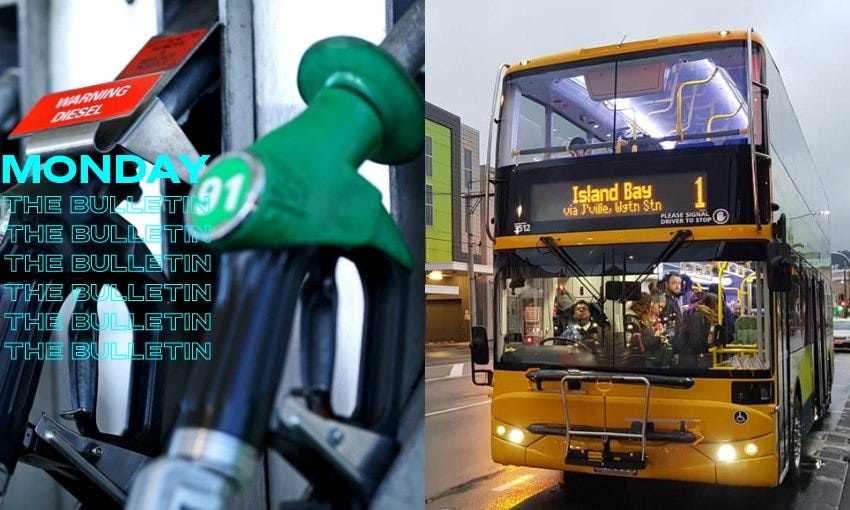Fuel tax cut and half price public transport extended
Ahead of the inflation figure announcement today, the government announced the extension at a Sunday afternoon press conference.
Mōrena and welcome to The Bulletin for Monday, July 18, by Anna Rawhiti-Connell. Presented in partnership with Z Energy.
In today’s edition: author of new book has copy of internal National Party review; NZ Rugby issues rare “not acceptable” statement; but first, government extends fuel excise cut and transport discounts ahead of inflation figures out today.
Fuel excise cut and half-price public transport extended until January 2023 (Photos: Alexander Robertson RNZ/Emma Hatton RNZ)
Minister says extension should lead to lower food prices
Yesterday, the government announced it will be extending reductions on fuel excise duty, road user charges (RUCs) and half price public transport fares until the end of January 2023. Finance minister Grant Robertson and energy minister Megan Woods made the announcement in a press conference that the media weren’t told about until Sunday morning. Transport minister Michael Wood said it will lead to lower prices for things like food because it would reduce the cost of transporting them around the country. As the Herald’s Thomas Coughlan reports, the government is under increasing pressure about domestic drivers of inflation.
Timing of announcement questioned with inflation figures out today
As 1 News’s Maiki Sherman pointed out, some people might be cynical about the timing, with consumer price index inflation figures due to be published today. ANZ bank is forecasting the rate to be 7.1%. Kiwibank chief economist Jarrod Kerr says a figure outside the band of 7% to 7.2% had the potential to move the market and feed through to retail interest rates. Robertson cited busy ministerial travel dairies when asked about the timing. National Party finance spokeswoman Nicola Willis questioned the timing, saying it was more “band-aid economics'' and that the government “must restore discipline to its own spending”.
Act says government making it up as it goes along
The Act party’s David Seymour also cited an example of Auckland Transport selling discounts in malls recently, designed to smooth the return to full price fares which were due to be reinstated on August 31. “That marketing effort is now worthless,” he said. Eric Crampton, chief economist at the New Zealand Initiative, recently detailed correspondence between the New Zealand Transport Agency Waka Kotahi and Ministry of Transport officials ahead of the March announcement that summises the policy work was done in 24 hours. Transport minister Michael Wood said it “was a relatively short period of time, but it was longer than 24 hours’’.
Policy designed to give New Zealanders certainty but can’t go on forever
Robertson said the policy couldn't go on forever and he was acutely aware that “having a ‘D Day'’ where it drops off straight away has certain consequences”. Writing this morning, Stuff’s political editor Luke Malpass says there’s a zero to zilch chance of the full excise, public transport fares and RUCs being reinstated before the election. Robertson also said they were expecting inflation to drop off over the second half of the year, crude oil prices to come down and wages to rise. Overseas, Spain has just announced free train travel for the rest of the year to tackle the cost of living and Germany has had great success with its €9 travel pass. Green Party spokesperson for transport, Julie Anne Genter, recently said that the three months of lost fuel tax revenue could have been used to future-proof lower North Island commuter rail.
Journalist details findings of internal National Party review in new book
Andrea Vance, a senior journalist at Stuff and former political reporter whose work often features in The Bulletin, has a new book out. Blue Blood is the story of the National Party’s post-Key years and, as Toby Manhire writes this morning, it contains many details not previously reported, including that National Party MPs were told not to talk to Vance shortly after Christopher Luxon became leader. Vance also got hold of a copy of the closely-guarded internal review of National’s 2020 election defeat. The review stated: “The genesis of the many issues faced by the party in the last term stem fundamentally from poor leadership and resulting bad culture and actions by bad actors which were often not called out early.” Manhire talked to Vance in a special episode of Gone By Lunchtime released this morning.
Time to pull the migration lever?
Businesses, hospitals and the opposition are pleading for a loosening of migrant worker restrictions to ease the intense labour shortages that are forcing cancellations and jury-rigged services up and down the motu. On RNZ’s Morning Report this morning, National Party finance spokeswoman Nicola Willis said the number one supply constraint in the economy right now is a lack of workers. In the latest episode of When the Facts Change, Bernard Hickey sat down to interview Productivity Commission chair Ganesh Nana to find out if a migration surge would solve our productivity problem, and why any decision to pull the migration lever must also look to pull the infrastructure investment lever.
If you love The Spinoff our newsletters are a great way to stay connected to what we’re about. We publish a range of great newsletters including ones on specific topics like business (Stocktake), food (The Boil Up), the environment (Future Proof) as well as wraps of our best work, The Daily and The Weekend. If you liked what you read today, share The Bulletin with friends, family and colleagues.
Click and collect
Almost half of local government members have experienced racism, gender discrimination or other forms of harmful behaviour.
Burial costs rising, calls to increase Work and Income funeral grant (paywalled).
MetService issues heavy rain and strong wind warnings across the South Island
Newspaper front pages from around the world as wildfires burn across Europe.
If you listened to The Australian’s podcast, The Teacher’s Pet, a judge is set to hand down his judgement in the murder trial of the accused, Chris Dawson.
Got some feedback about The Bulletin, or anything in the news? Get in touch with me at thebulletin@thespinoff.co.nz
Alex Casey explains why today we’re launching Bleed Week, a week dedicated to all things menstruation-related; NZ’s Michael Baker and Australia’s Tony Blakely compare and contrast the two nations’ current Covid responses; Chris Schulz explores why he finds rugby’s head knocks so hard to watch, and what it could mean for the future of the sport; and Stewart Sowman-Lund shares the mind-bending news that there are at least three other New Zealands out there.
All Blacks’ performances against Ireland deemed unacceptable
I watched the game on Saturday because it was a decider. I mused that the All Blacks losing from time to time actually made me more interested in them. Look at the depth of feeling on display right now. Anyway, things look to be getting to the pointy end of the stick for All Blacks coach Ian Foster as New Zealand Rugby issued a statement saying the All Blacks’ performances were “unacceptable”. The usual post-match press conference with the coach was cancelled yesterday. The Bounce’s Dylan Cleaver writes that Foster said he didn’t know why it had been cancelled and that Foster not being looped in is probably not a good sign. Scotty Stevenson didn’t want to talk about the loss, writing on The Spinoff that he would “write something about what happens when you package up 120 years of respected representative sporting success, call it a brand, and sell it off to Oxbridge dudebro buddies in an act of ego-inflating, nausea-inducing corporate capriciousness.”
Low death tolls after recent heat waves in India and Pakistan
The New York Times’ David Wallace Wells looks at why death tolls during the recent heatwaves in India and Pakistan were “mysteriously low”. As he writes, “about a fifth of the human population was just subjected to almost unimaginably long-lasting extreme heat, and the ultimate toll, if we can accurately assess it, will tell us quite a lot about how some of us might suffer through the future climate.”
Just a note on some of the long reads I include: a lot of overseas publications like the New York Times obviously have paywalls but they do allow people to read up to ten free articles a month without becoming a subscriber. It’s always a hard call on whether to include them for you as I don’t know how much you’re all reading, but I’ve run with this one as it’s topical and very interesting. I do try to hunt out non-paywalled sites for you.











